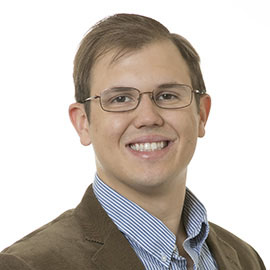The H. Milton Stewart School of Industrial and Systems Engineering (ISyE) announced that two first-year Ph.D. students, Arden Baxter (OR) and Christopher Muir (OR), have been awarded Graduate Research Fellowships (GRF) by the National Science Foundation (NSF). This means that ISyE students have received half of the total four grants given by the NSF in the industrial engineering/operations research category.
Baxter, who has a bachelor’s degree from Rollins College in math and computer science, is advised by William W. George Chair and Professor Pinar Keskinocak, who also directs the Center for Health and Humanitarian Systems. Baxter is passionate about combining math with community impact and, accordingly, is focusing her research on resource allocation problems – specifically how to coordinate resources geographically and over time to meet demand using an integer-programming model.
She explained, “This particularly applies in disasters and emergencies. For example, after a hurricane, you may have people who have medical emergencies and need help from EMS. But they could be in a flooded area where ambulances can’t go, so that would be an instance where someone needs both water rescue services and EMS at the same time. So our model would help coordinate those two resources.”
“I am delighted that Arden received the NSF fellowship, and it is well-deserved,” said Keskinocak. “Arden is a very talented student and passionate about her research, which focuses on the allocation and coordination of scarce resources to meet needs, especially during emergencies. The problem is complex, involving multiple tradeoffs, objectives, and constraints. It is difficult even when there is a single decision maker who has full information about the context. It becomes significantly more challenging when there are multiple decision makers and uncertainty about demand or resource availability. The NSF fellowship will bolster Arden’s efforts toward developing new models and solution approaches for this important problem, and making a positive impact on society through her research and outreach to the next generation of students.”
Muir, who has a bachelor’s degree in industrial engineering from the University of Tennessee, Knoxville, is advised by Leo and Louise Benatar Early Career Professor and Associate Professor Alejandro Toriello. Muir has been interested in optimization problems since taking high school calculus, and he is examining dynamic versions of common discrete optimization problems. His specific application is with online server scheduling.
Online scheduling is an issue for companies such as Amazon (AWS), Microsoft (Azure), and IBM (Cloud), which run large computing resources that customers can request and make use of.
Online scheduling comes into play as the companies determine how to most efficiently use their resources, which means making decisions about accepting or rejecting jobs, and determining the order in which to run them.
“This is server scheduling in which you only have partial information regarding, for example, when jobs will come in. So you have to either accept or reject scheduling decisions on the fly,” Muir said. “The question is how to do that in an optimal way that maximizes the expected return on running the server.”
“I am delighted that Chris has been awarded an NSF GRF,” said Toriello. “His work on the online independent set problem and its applications in online scheduling is in many ways an ideal topic for him. The model is fundamental in our field and underlies many complex decision problems, and many current applications require actions to be taken with only partial information in small fractions of a second -- for example, scheduling computing resources in the cloud. Chris has quite a bit of relevant research experience, especially his work on the deterministic independent set problem with his undergrad mentor at UT, Associate Professor Jim Ostrowski.
“We already have some interesting and unexpected results after only a few months, and the support from the NSF will allow Chris to continue his promising work in the area over the course of his doctoral studies,” Toriello added.
Another Keskinocak advisee, first-year Ph.D. student Hannah Wilborn, received an honorable mention from the NSF GRF program. Wilborn is studying optimal strategies for restoring damaged systems of interdependent infrastructure networks following a disruptive event such as a natural disaster. She hopes to develop general results for complex network improvement problems like these.
Established in 1951, the NSF GRF Program recognizes and supports outstanding graduate students in NSF-supported STEM disciplines who are pursuing research-based graduate degrees at accredited U.S. institutions. Fellows receive a three-year annual stipend of $34,000, along with a $12,000 cost of education allowance for tuition and fees (paid to the institution), opportunities for international research and professional development, and the freedom to conduct their own research at any accredited U.S. institution of graduate education they choose.

